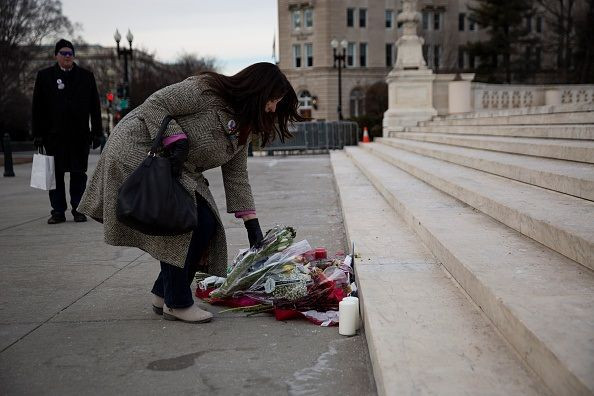Republicans Gear Up For Supreme Court Battle After Scalia's Death

Republican lawmakers and presidential candidates hardened their positions over the weekend on blocking a move by President Barack Obama to fill the Supreme Court seat left by the late conservative Justice Antonin Scalia, a lifetime appointment that would help decide some of the most divisive issues facing Americans.
The next justice could tilt the balance of the nation's highest court, which was left with four conservatives and four liberals. The vacancy quickly became an issue in the 2016 presidential race.
"We ought to make the 2016 election a referendum on the Supreme Court," U.S. Senator and Republican presidential candidate Ted Cruz said on NBC's "Meet the Press."
The normally nine-justice court is set to decide this year its first major abortion case in nearly a decade, as well as cases on voting rights, affirmative action and immigration.
Scalia, 79, died on Saturday at a West Texas resort. The cause of death will not be determined for several days, the top official in the county where he died, Presidio County Judge Cinderela Gueara, said on Sunday in an interview with local TV station WFAA-TV.
Obama, a Democrat, will nominate someone to fill the empty seat but will wait until the U.S. Senate is back in session, the White House said on Sunday. The Senate returns from recess on Feb. 22.
"At that point, we expect the Senate to consider that nominee, consistent with their responsibilities laid out in the United States Constitution," White House spokesman Eric Schultz said.
The White House declined to give a more specific timeline for Obama to announce his nominee. The nomination will set up a battle with the Republican-controlled chamber, which must approve any nominee.
Shortly after news of Scalia's death, Republicans vowed not to act on the vacancy until Obama's successor takes office next January. Senate Democratic leader Harry Reid said failure to act would be a "shameful abdication" of the Senate's constitutional duty.
Both sides said history was on their side.
Reid said it would be unprecedented to have a vacancy on the court for a year. In the modern era, the longest Supreme Court vacancy was 363 days after Abe Fortas resigned in May 1969.
Republicans cited 80 years of tradition in which no Supreme Court nominees were approved in presidential election years. In fact, Justice Anthony Kennedy was approved in 1988, after a bruising battle in which the Senate rejected President Ronald Reagan's first nominee, conservative Robert Bork.
Supreme Court nominations are rare, so neither side has much data to rely on in determining precedents. History is also an unreliable guide as the nomination process has become significantly more politicized in recent years.
For Obama's previous two Supreme Court picks, Elena Kagan and Sonia Sotomayor, he took about 30 days each to announce the elections after their predecessors, Justice John Paul Stevens and Justice David Souter, respectively, said they planned to step down.
DEEP DIVISIONS
Ohio Governor John Kasich, a moderate among the Republicans vying for the White House, said the Senate should wait because a battle this year would only deepen divisions in the country.
"You know how polarized everything is," Kasich said on ABC's "This Week." "What I don't want to see is more fighting and more recrimination."
Democratic U.S. Senator Patrick Leahy warned that a delay could have consequences in November's election, when voters get to decide who fills one-third of the Senate's seats.
"If the Republican leadership refuses to even hold a hearing, I think that is going to guarantee they lose control of the Senate, because I don't think the American people will stand for that," he said on CNN's "State of the Union."
Democratic presidential candidate Bernie Sanders said the Constitution was clear. "The president makes the appointment, Senate confirms, let's get on with that business," the senator from Vermont said on "Fox News Sunday."
One possible contender to replace Scalia is an Indian-American appeals court judge, Sri Srinivasan, who has pro-business credentials and a stellar resume. His nomination could make it more politically challenging for Republicans to block anyone put forward by Obama.
Cruz, a Texas lawmaker, who sits on the Senate Judiciary Committee that takes the lead on Supreme Court nominees, said the vacancy left by Scalia made the presidential election even more critical.
He warned that a justice chosen by Sanders or his Democratic presidential rival, Hillary Clinton, would mean the Second Amendment right to bear arms would be "written out" of the Constitution and abortion on demand would become the law of the land.
Republican U.S. Senator Marco Rubio of Florida, another White House candidate, said he would want someone who echoed Scalia's "originalist" ideology that looks at the U.S. Constitution through the lens of its framers' 18th-century intentions.
Republican presidential front-runner Donald Trump, appearing on NBC, was more direct when asked what he would want: "Someone just like Justice Scalia."
That would mean someone who did not let ideological differences preclude civility or even friendship, former President Bill Clinton told CNN, citing Scalia's bond with liberal Justice Ruth Bader Ginsburg.
Ginsburg, in a statement on Sunday, called her friend "a jurist of captivating brilliance and wit" with whom she disagreed "now and then."
She cited a duet sung by the two justices in the 2015 opera "Scalia/Ginsburg" titled: "We are different, we are one." She and Scalia, Ginsburg wrote, were "different in our interpretation of written texts, one in our reverence for the Constitution and the institution we serve."
(Additional reporting by Joan Biskupic, Alana Wise, Timothy Gardner in Washington; Sara Vasquez in Marfa, Texas; Writing by Doina Chiacu; Editing by Jonathan Oatis and Peter Cooney)
© Copyright Thomson Reuters 2024. All rights reserved.





















